Kevin Nunes shooting: The police mistakes that sank a murder case
- Published
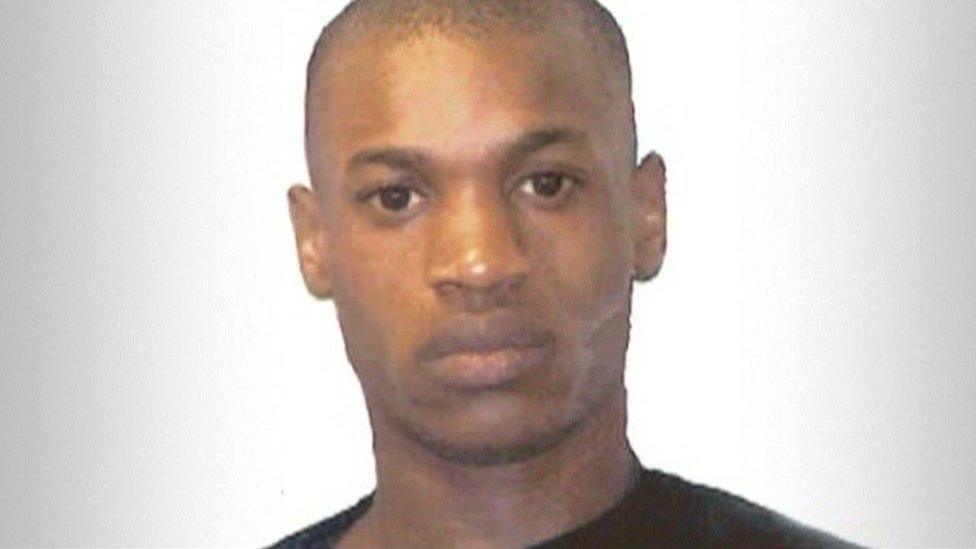
The killing of Kevin Nunes in 2002 remains unsolved after a string of police mistakes
A promising young footballer shot dead. Five men jailed for his murder released after a catalogue of police mistakes.
Fifteen years on from his cold-blooded killing, the family of Kevin Nunes have no answers to their questions, no-one has been held responsible for his death and no police officers have been disciplined.
Here, those at the centre of the saga tell their stories to File on 4.
Things could have worked out very differently for Kevin Nunes. Arriving in the UK from Jamaica as a schoolboy, he began to show promise as a talented footballer.
He impressed scouts at Tottenham Hotspur, and was on Leyton Orient's books. When he moved to the West Midlands, he began playing for Stafford Rangers semi-professionally.
At about the same time, 18-year-old Leanne Williams, from Wolverhampton, caught his eye.
"A friend phoned me and said that somebody liked me, so I went to see who - I was quite intrigued," she recalls.
"He was a good person. He liked playing football, going to the gym and just hanging out really. He was very committed in football."
Kevin Nunes murder: Shock as police mistakes go unpunished
By 2002, Leanne was pregnant with his son. But any hopes of Kevin realising his dream as a professional footballer had begun to fade.
He had started hanging around with a bad crowd - a gang of drug dealers linked to a notorious criminal gang in Heath Town, Wolverhampton.
He learned there was quite a bit of money to be made buying cheap cocaine in the West Midlands, and selling it on in Aberdeen.
In what was known as the "Aberdeen run", small-time dealers would board a train in Wolverhampton and head up to the Scottish city, making three or four times as much as they could back at home.
Kevin, then 20, began making several trips. But his money-making scheme did not last long after he clashed with gang members back in the Midlands.
Kevin's bullet-ridden body was found on a grass verge near a farm in the Staffordshire village of Pattingham in September 2002.
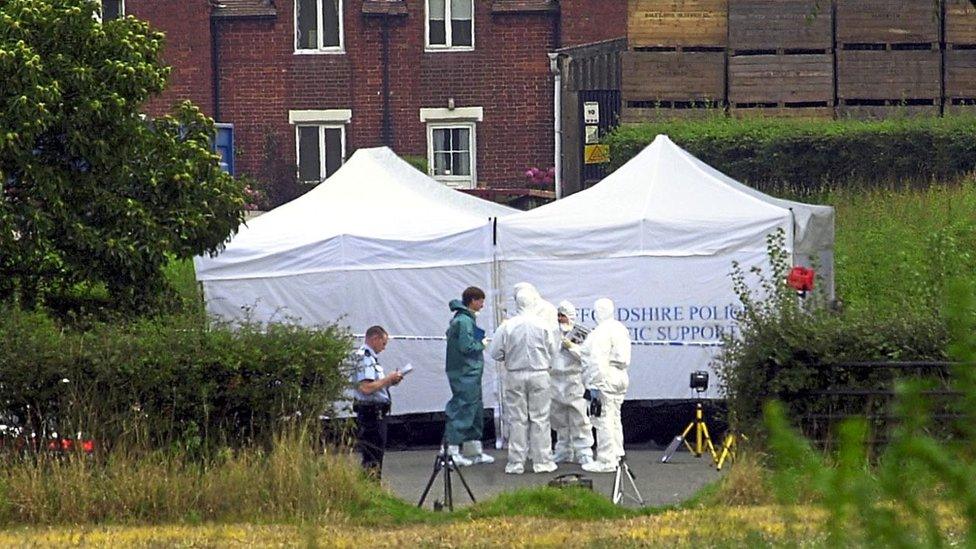
Staffordshire Police began a murder investigation after finding a body near a farm
Leanne, who had been frantically looking for her boyfriend after he failed to return home, was visited by Staffordshire Police and quizzed about his last known movements.
"The last thing they asked me was what was he wearing. I said 'red cardigan, jeans, white trainers', and they said 'sorry to tell you, it is Kevin we found'.
"I broke down and started crying. Up to this day I don't know what happened or why."
Detectives took about 1,000 statements but, as is often the case with gangland killings, no-one was willing to put a name to anyone responsible.
Star witness
"They said that they were met with reluctance and that wall of silence, which I know amongst the black community - it's a thing there between the police and ethnic minority, really," says Leanne.
"There's not really that trust there, because we don't believe that they're for us in that way, you know."
But in 2005, a man by the name of Simeon Taylor came forward with key information.
He told detectives that he had been there when Kevin was repeatedly shot and beaten by five men, having driven one of them to the scene.
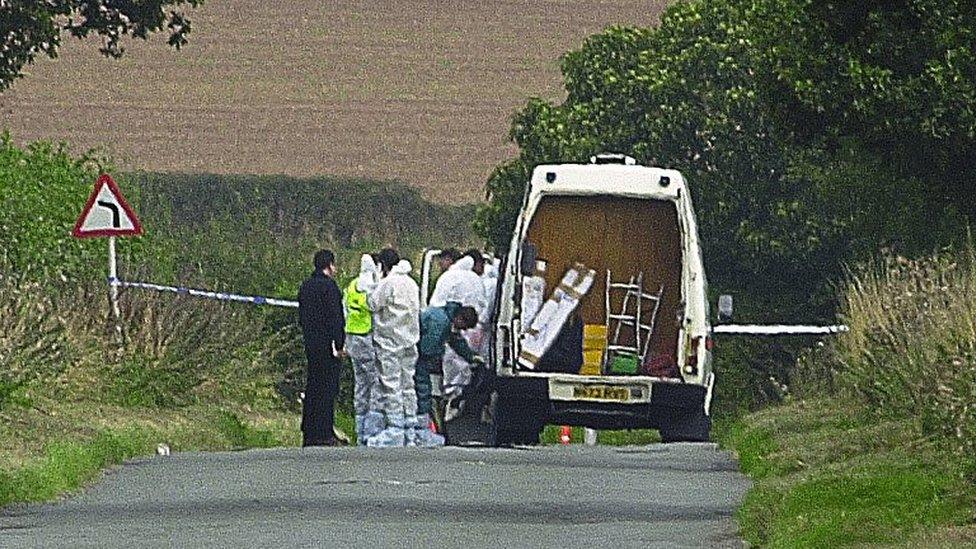
Police said the killing of Kevin Nunes was gang related
He denied being involved in the murder, and said he was willing to give evidence at a trial.
Already in jail for another offence, when released, Taylor was given protective witness status. It was the job of Staffordshire Police's sensitive policing unit (SPU) to keep him safe ahead of the trial.
The force had their star witness. Five men were in custody awaiting trial for murder. But it is at this point that the investigation started to go very wrong indeed.
Drugs paraphernalia
As the only person placing the five suspects at the murder scene, Taylor was afforded gold-plated police protection, and he knew it.
He continued to commit crime - such as being in possession of an offensive weapon - but was never charged amid fears it would harm his role as key witness.
His handlers had to clear up drugs paraphernalia he left behind in hotel rooms and safe houses - with no consequences for Taylor.
He was even taken on nights out drinking with officers.
But the most startling revelation is that while on the witness protection scheme, he and his relatives were sent on a lavish, taxpayer-funded trip to South Africa, believed to have cost up to £10,000, external, as part of a potential relocation package.
His behaviour was so bad, he was asked to leave the country.

Nights out and a trip to South Africa: Simeon Taylor was given gold-plated police protection
Joe Anderson, a former detective inspector who had recently taken charge of the SPU, was flabbergasted.
"I found out he was sent to South Africa - his mother and his two brothers were also sent to South Africa, and spent several weeks over there having a holiday.
"Staffordshire Police was held to ransom, and Staffordshire Police gave in to the vast majority of [the] demands."
Despite being informed about Taylor's behaviour - he had breached a behaviour code of conduct 76 times - Staffordshire's then head of crime, Assistant Chief Constable Suzette Davenport recommended he continue to be granted protected witness status.
"The bottom line is that because of the type of lifestyle he was involved in, I feared for his life," she now says, speaking for the first time on the subject.
"And one of the overriding drivers, because I am a public servant, is to protect life and property, and I absolutely feared that if he wasn't within that protection scheme - regardless of if he might have given evidence or not - that he would potentially have come to significant harm. I feared for his life."
But when Taylor cancelled a hotel booking police made for him, keeping the £320 refund, it was enough to make Det Insp Anderson turn whistleblower.
He believed colleagues had deliberately not recorded this, knowing it could jeopardise the investigation.
"Constantly the words that kept being used to me were, we must get him to court at all costs," said the officer.
This time, he went to Supt Jane Sawyers, the then head of Professional Standards for Staffordshire Police.
He told her he believed what was happening in his department amounted to corruption.
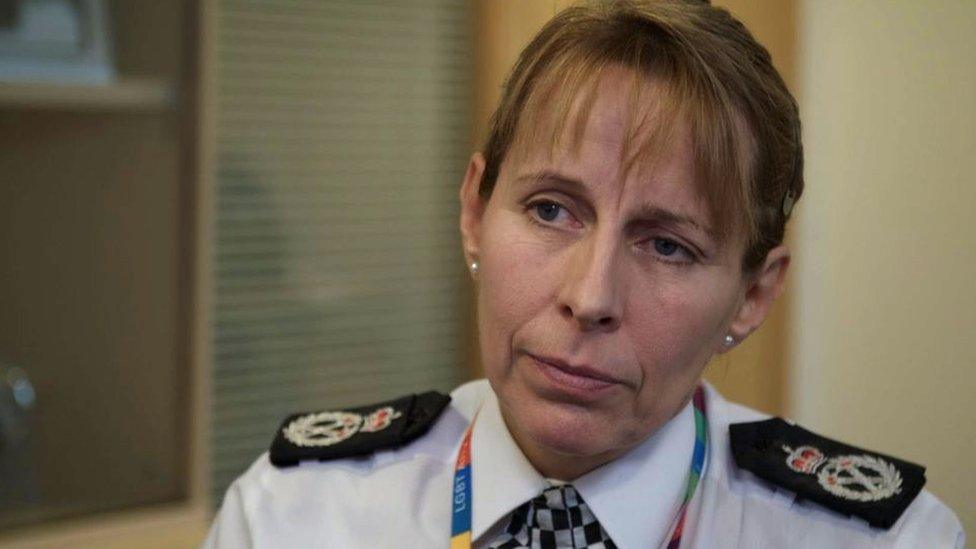
Jane Sawyers has now retired from Staffordshire Police, where she rose to be chief constable
But in her first interview about the case, she recalls a different conversation, during which Det Insp Anderson complained about a lack of professionalism and management support.
Ms Sawyers spoke to her line manager, the then Deputy Chief Constable Adrian Lee, who commissioned an internal review into the department's actions.
It was completed in 2007, before the murder trial took place. The report "exposed failings in the structure, procedures, working practices, culture and management of the unit".
Officers were criticised for socialising with Taylor, and concerns were also raised over the amount of money being spent on him.
A defence lawyer could suggest this amounted to a bribe, the review added.
One member of the SPU was given formal advice by a senior officer, another was put in a different unit.
But the contents of the report were only circulated between a handful of senior officers, and were not disclosed to detectives investigating Kevin's murder.
The murder trial went ahead in January 2008, and five men were found guilty and handed life sentences.
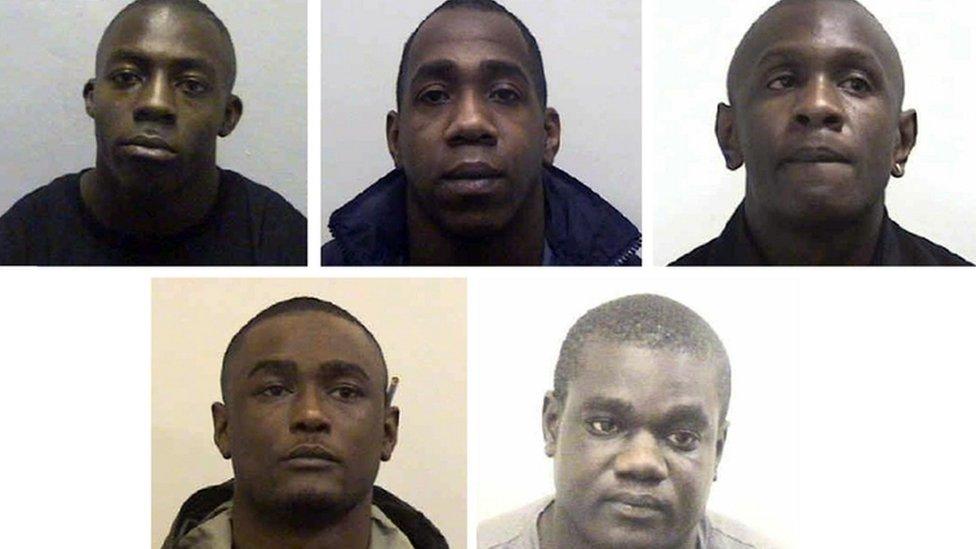
These are the five men Simeon Taylor said were involved in Kevin Nunes' murder. Their convictions were later overturned
Adam Joof and Antonio Christie were jailed for a minimum of 28 years; Levi Walker and Michael Osbourne were handed 27-year tariffs, and Owen Crooks was given at least 25 years in prison.
Leanne, who had travelled to court with her mother and brother Benji, was overwhelmed at the verdicts.
"I cried and I was overjoyed, you know, because I didn't think anybody would get convicted of Kevin's murder.
"I just thought it would be another unsolved case, to be honest."
Leanne and her family moved on with their lives. But two years later, rumours emerged the five men were appealing against their convictions.
Simeon Taylor had been secretly recorded telling a friend he lied in court.
'Shell-shocked'
The Criminal Cases Review Commission (CCRC) launched an investigation called Operation Kalmia.
Still concerned the case had been mishandled, Joe Anderson, says he approached Marcus Beale, then the assistant chief constable at the Staffordshire force.
When he heard nothing back, he took his complaints to the CCRC.
"I think the word I'd use is 'shell-shocked'," he says.
"They were clearly shocked at what I was telling them. They told me to go back to the force to secure whatever evidence I could, copy everything and retain everything and bring it back to them."
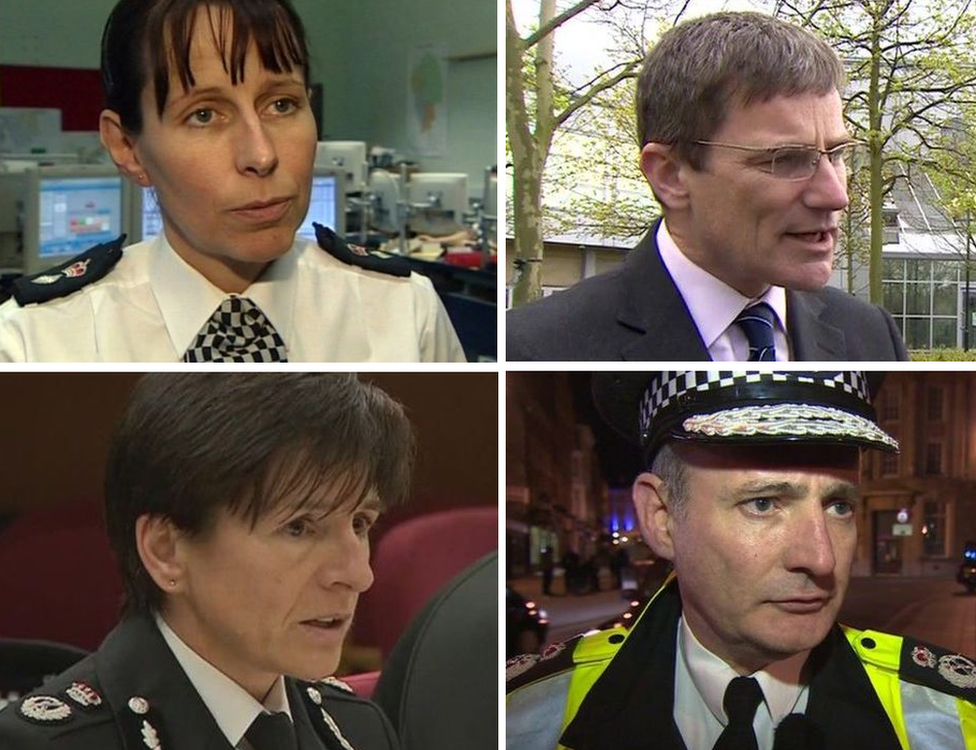
Clockwise from top left, Jane Sawyers, Marcus Beale, Adrian Lee and Suzette Davenport
The chief constable of Derbyshire, Mick Creedon, was put in charge of the probe, which concluded the initial report into the handling of Taylor should have been disclosed long before the trial went ahead.
All five men's convictions were overturned at the Appeal Court on 4 July 2012.
Lord Justice Hooper said the case was "seriously flawed".
"It's to be hoped that the appropriate measures will be taken against those responsible for what appears to be a serious perversion of the course of justice," he concluded.
The Independent Police Complaints Commission took up the investigation.
'Collective failure'
Meanwhile, the four senior officers under investigation had moved up the ranks since 2012.
Adrian Lee was chief constable in Northamptonshire; Suzette Davenport was about to be promoted to be chief in Gloucestershire; Jane Sawyers was poised to become chief constable in Staffordshire, and Marcus Beale was an assistant chief constable in the West Midlands with responsibility for counter-terrorism.
While Mick Creedon's review found the officers did have a case to answer for gross misconduct, the IPCC ultimately concluded no action would be taken following discussions with the officers' own police and crime commissioners.
Agreeing there had been a collective failure, they all said that there was no evidence that could point to an individual being held responsible and so none faced misconduct charges.
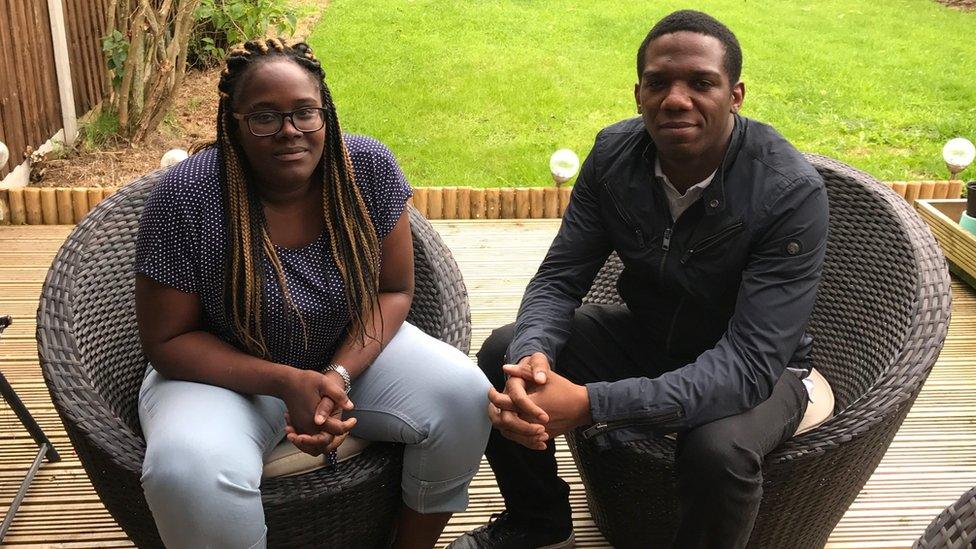
Leanne and her brother Benji still want answers over Kevin's death
Three years after the report was completed, its findings were made public this month.
While it found "significant and serious collective failings within Staffordshire Police" and serious problems with the handling of the protected witness, it concluded there was no deliberate conspiracy.
Jane Sawyers, who retired earlier this year, acknowledges "serious mistakes" were made.
"There was a cock-up, without a shadow of a doubt. There wasn't a cover-up and there wasn't a conspiracy," she adds.
She describes the family of Kevin as being "incredibly dignified" throughout the whole process.
"As I said right at the outset, they've lost a member of their family and they've had absolutely no closure on those responsible for the murder of Kevin. It's a regret of mine."
'It's shocking'
Fourteen officers were investigated by Operation Kalmia. Thirteen have retired including the three of the most senior. Only Mr Beale is still a serving officer.
Two of the five men cleared of Kevin's murder were awarded £200,000 in damages from Staffordshire Police earlier this year, and it is thought the others may lodge their own claims.
Leanne, whose son is nearly 15, still dreams of justice for Kevin.
"Nobody has been punished, nobody is held accountable, so to me, a report is nothing.
"How is it that nobody, not one person, has been disciplined - nobody?
"It's just shocking to me, it's just absolutely shocking and I just think it's really, really, really, bad."
The full report can be heard on File on 4, Tuesday 17 October, at 20:00 and afterwards on iPlayer.
*Additional reporting by Rebecca Woods
- Published4 October 2017

- Published28 July 2017

- Published16 January 2017
